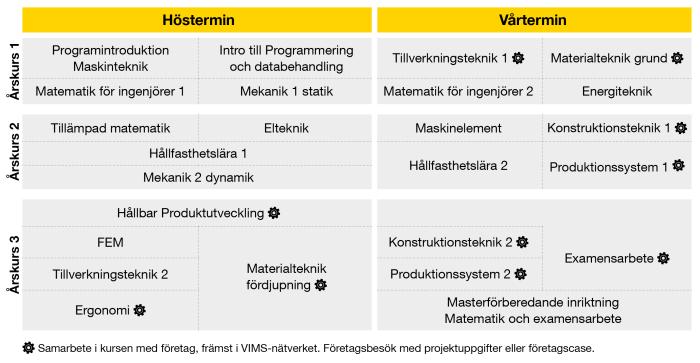Study Programme in Mechanical Engineering

Study programme
Mechanical engineers are needed to develop, run and maintain many of the technical systems in operation today. Examples of operations in continuous need of mechanical engineers are the manufacturing of food, vehicles, paper, household appliances and pharmaceutical products. Most industrial operations depend on the reliability of machines and apparatuses and therefore efforts are constantly made to improve the systems and machinery used.
Prerequisites
General entry requirements + Physics 2, Chemistry 1, Mathematics 3c/Mathematics D
While studying
Education
Our mechanical engineering programme is designed to provide a broad education in the field. Subjects, such as mechanics, materials engineering, solid mechanics and mathematics, are included and constitute an essential foundation for manufacturing technique, machine components, mechatronics, hydraulics, CAD, and production and design techniques. All courses have substantial elements of hands-on tasks for applying and testing theories since this is important for learning. Students are well prepared for an interesting, stimulating and rewarding professional career. A degree project, in which students apply knowledge and practise engineering skills to a real problem, concludes the programme.Form of Instruction
Instruction is given in form of lectures, classes, laboratory work and project work.Examination
There are no set examination periods, and generally no final exam at the end of a semester, an academic year, or a complete study programme. Examination usually takes place at the end of each course, module, or unit.Professional Contact
In the course of study students establish contact with workplaces through field trips, projects and lectures. The concluding degree project is usually carried out in conjunction with a company.Course of study
| Semester 1 | ECTS credits |
|---|---|
| Introduction to Mechanical engineering at the Bachelor level (Obligatory) | 7.5 |
| Mathematics for Engineers I (Obligatory) | 7.5 |
| Introduction to programming and data processing (Obligatory) | 7.5 |
| Mechanics 1: statics (Obligatory) | 7.5 |
| Semester 2 | ECTS credits |
|---|---|
| Manufacturing Technology 1 (Obligatory) | 7.5 |
| Mathematics for Engineers II (Obligatory) | 7.5 |
| Materials Engineering, basic course (Obligatory) | 7.5 |
| Fundamental Energy Technology (Obligatory) | 7.5 |
| Semester 3 | ECTS credits |
|---|---|
| Applied Mathematics (Obligatory) | 7.5 |
| Solid Mechanics I for Bachelor students in engineering science (Obligatory) | 7.5 |
| Mechanics 2: dynamics (Obligatory) | 7.5 |
| Electrical technology (Obligatory) | 7.5 |
| Semester 4 | ECTS credits |
|---|---|
| Machine components (Obligatory) | 7.5 |
| Solid Mechanics II for Bachelor students in engineering science (Obligatory) | 7.5 |
| Production Systems I (Obligatory) | 7.5 |
| Machine design I, Study Programme in Engineering (Obligatory) | 7.5 |
| Semester 5 | ECTS credits |
|---|---|
| Sustainable Product Development (Obligatory) | 15 |
| Finite Element Methods for Bachelors students (Elective) | 7.5 |
| Manufacturing Technology 2 (Elective) | 7.5 |
| Ergonomics (Elective) | 7.5 |
| Materials Engineering, advanced course (Obligatory) | 7.5 |
| Semester 6 | ECTS credits |
|---|---|
| Production Systems II (Elective) | 7.5 |
| Engineering Design II, Mechanical Engineering (Elective) | 7.5 |
| Linear Algebra (Elective) | 7.5 |
| Degree Project for Bachelor of Science in Mechanical Engineering (Obligatory) | 22.5 |
*Full-time study always equals 30 ECTS credits per semester (20 weeks).
Please note - not all programmes offer elective or optional courses.
Elective course: Students are free to choose among certain alternative courses, often depending on their choice of specialisation.
Optional course: Students are free to choose any course offered at Karlstad University or at other universities. Courses listed are examples of recommended or frequently chosen courses for a specific programme.
Academic year and program evaluations
Start semester Autumn 2013
Start semester Autumn 2014
Start semester Autumn 2015
Start semester Autumn 2016
Start semester Autumn 2017
Start semester Autumn 2018
Start semester Autumn 2019
Start semester Autumn 2020
Start semester Autumn 2021
Start semester Autumn 2022

Future prospects
Employment Market
The demand for mechanical engineering graduates is not expected to abate in the future, especially not in the energy and vehicle industries. In addition, the competence of mechanical engineers is well-known in many other areas. Former students have jobs in many different areas.Degree
Degree of Bachelor of Science in Mechanical EngineeringFurther Studies
The education is part of the new flexible education structure in Europe. With your degree you can, provided that you have the necessary mandatory courses, continue your studies aiming for a masters degree in computer science, either at Karlstad University or at other universities in Europe. Studies at the advanced level make you eligible for doctoral studies.Tuition fees
- Total fee: 450,000 SEK
- Per semester / First payment: 75,000 SEK
You do not have to pay tuition fees if you are an exchange student or a citizen of a country within the European Union (EU), the European Economic Area (EEA), or Switzerland.
